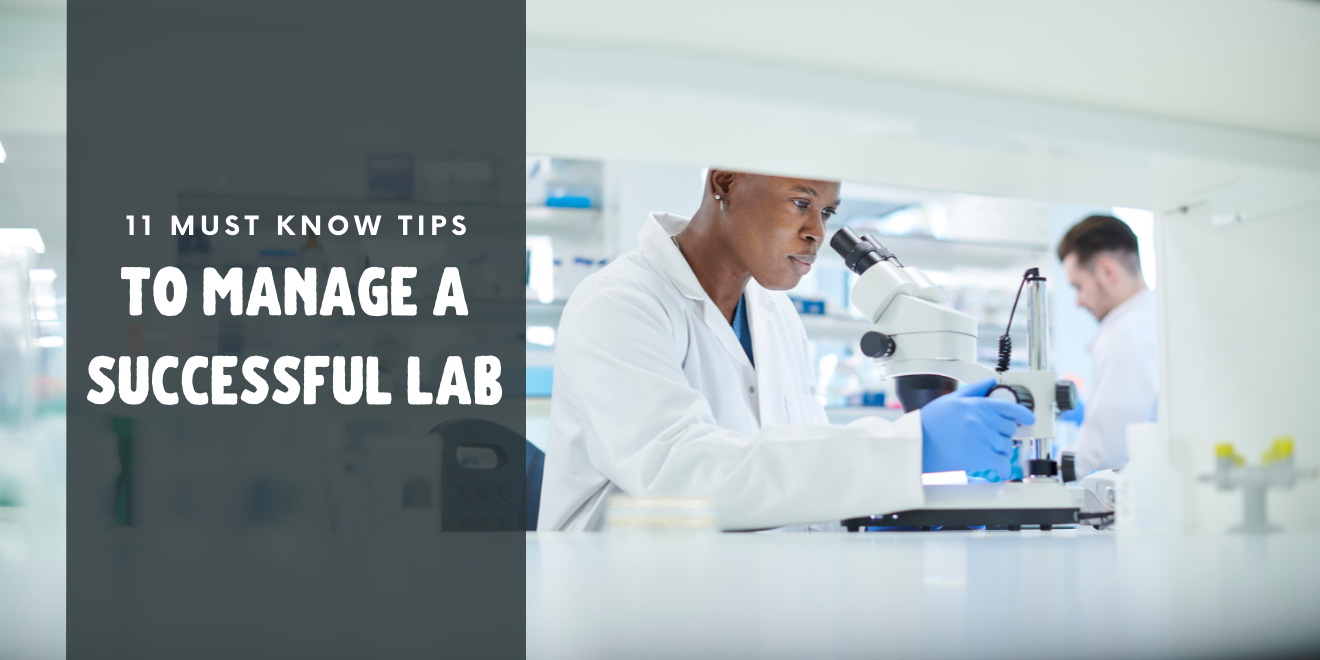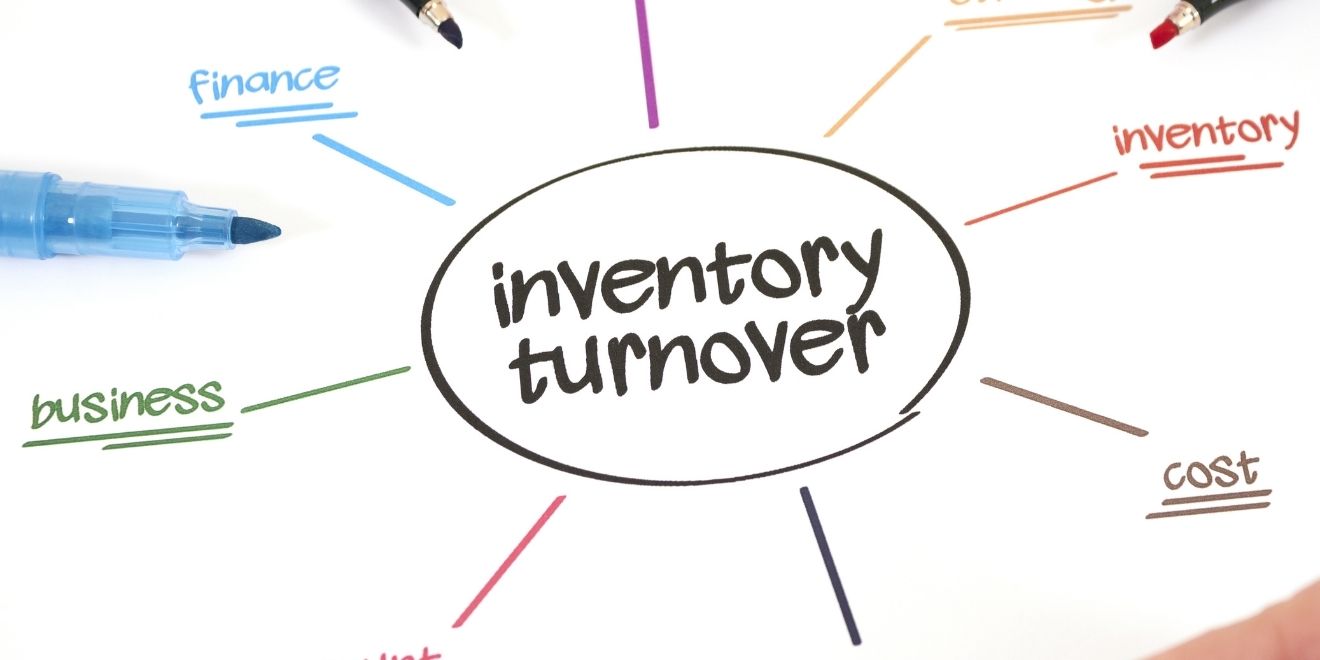11 Lab Management Tips Every Lab Needs to Know

Lab management aims at guiding lab personnel to deliver their duties within the allocated time and resources. It may involve acquiring grants, equipment, personnel, and other necessary tools.
Lab managers design workflows , oversee daily lab operations, and train new lab personnel.
They also set lab objectives, design long-term plans, assign tasks, monitor, and evaluate staff progress, customer satisfaction, and performance, develop and administer the budget, and review regulatory requirements.
Effective lab management involves planning, organizing, leadership, and controlling. A good lab manager should have analytical, management, interpersonal, problem-solving, leadership skills , and more.
This article outlines eleven lab management tips.
Every laboratory has a large, complex supply inventory. Ensuring proper inventory control is essential for the continuity of operations because running short of crucial medical lab supplies can stop all or part of lab activities.

For effective inventory management, creating a catalog of the supplies used in your lab is the first step. The catalog is meant to reduce costs and increase productivity. Without an official supplies catalog, the lab personnel is likely to order various supplies that are the same, causing wastage and may result in productivity issues. When choosing lab supplies, you should be guided by price, shelf life, expected use, availability considerations, and even their usage in different protocols.
Preparing a supply catalog makes it easy to purchase. Once your orders have been delivered to the lab, they should go through a formal onboarding process. Track supplies that have not been onboarded by updating their storage location, status, and quantity.
The tracking should depend on how crucial the supply is, how costly it is, how hard it is to get and how fast it’s used. Investing in a Laboratory Information Management System (LIMS) eases supplies and reagents inventory management.

Lab management courses, especially if you're a young lab manager, help you avoid making costly mistakes. Honing your management skills and knowledge ensures effective lab management, increases productivity, ensures happy lab staff, and improves the lab's bottom line.
Time management is vital in lab management, and how you schedule your day impacts your efficiency.
The staff members who are most productive in the mornings will do better at that time, while those who concentrate better in the afternoons will be more productive then. As you grow, learn to leverage the resources at your disposal because it’s impossible to handle everything alone. Delegating will help free your time. To lessen your workload, consider training some of your administrative and research staff to handle part of the work.
Understand the capacity you have and the demand for it. If you want an efficient, responsive system, avoid pushing your capacity beyond 90%. Build a hierarchy that helps you manage your workload and hold regular meetings, creating a natural rhythm, synchronization, and a culture that gets results. Embracing the art of delegation means you'll do less while getting more done.

While being responsible for an entire team may seem daunting at first, it's doable. Being in a position of power implies that the final decision rests with you, so make choices for the whole team, not an individual.
As a lab manager, you should make confident and critical decisions while inspiring the team with logical judgments. A good lab manager maintains enthusiasm and motivation among their team members. Always listen to your subordinates, let everyone know of their targets and goals, and ensure the team is working together to better the lab.
Labs depend on equipment and staff for success. Consider prioritizing your employees based on your lab goals, employee skills set, and equipment types and ensuring that test types are all well aligned for the best possible performance.

Allocating tasks that match employee skills facilitates project success and improve staff motivation, performance, and productivity. Evaluate your staff regularly to understand their upcoming skills and interest in other areas to determine underutilized potential and improve task scheduling.
Your staff members need to set smaller, attainable goals to help them attain the long-term ones. Break bigger goals into smaller ones to make them less daunting and easily achievable and ensure that they can be modified as situations change or things don't go as expected.
The set goals should be collaborative, meaning they encourage the team to work together by ensuring the goals' scope and duration have precise limits. Your goals should be emotional, meaning they must be something your staff cares about, so they use their passion to make them more achievable and fulfilling.

Skilled lab personnel equals a successful laboratory. Determine the skills you want your lab members to develop, including practical lab skills and interpersonal skills. There are several lab skills based on different fields.
Common lab skills include measuring PH, pipetting, weighing, lab equipment sterilization, and lab safety. When you help your team develop and improve their skills, their productivity, motivation, and confidence increase, resulting in a successful lab. Challenge your staff to get out of their comfort zone to build on the skills they aren't good at, boosting your lab's success and growth.
Employee micromanagement results in low morale, reduced productivity, high turnover rates, and patient dissatisfaction. It also reduces growth potential in your business while causing burnout on the micromanager.
Micromanagement results in a loss of trust between you and your staff, causes employees to be entirely dependent on you instead of performing their tasks confidently, and crushes employee creativity, killing innovation. Consider giving your lab team the freedom to plan their work, manage their time, and learn from their failures and mistakes. Let them know that they can seek your guidance, advice, help, and even discuss with you.

Effective communication , formal and informal, is crucial for providing excellent team morale and a great working atmosphere. Communicating the lab's goals and objectives ensure everybody is working towards the good of the lab. Schedule regular one-on-one conversations with your staff to give them a chance to discuss any concerns they might have before escalating into more significant problems.
Most lab managerial duties are within the lab, so interactions with staff members should be effective and efficient. Through an effective communication process, lab managers can identify and troubleshoot any issues that need to be overcome while providing a detailed picture of work, including how it's progressing and if strategic or tactical changes should be made to ensure success. Lab staff are highly skilled and can comfortably use technical terms when communicating about work. Understanding famous lab terms and the language they use eases communication.
As science and technology evolve, lab activities also evolve. Remaining up-to-date on the latest trends and developments in the industry fosters growth concerning lab work scope and employee competency. Ensure your staff is also updated regarding industry changes, trends, and developments for the success of your lab.
While a lab manager has a technical skills background, they need non-technical skills to succeed in the role. Consider investing in relevant new skills to benefit the lab in the long term. Encourage your employees to acquire new skills to ensure everyone is on the same page.
A lab manager handles all laboratory aspects to ensure it runs smoothly, increasing productivity and profits. Consider applying these lab management tips for the success and growth of your lab.
Lab managers design workflows , oversee daily lab operations, and train new lab personnel.
They also set lab objectives, design long-term plans, assign tasks, monitor, and evaluate staff progress, customer satisfaction, and performance, develop and administer the budget, and review regulatory requirements.
Effective lab management involves planning, organizing, leadership, and controlling. A good lab manager should have analytical, management, interpersonal, problem-solving, leadership skills , and more.
This article outlines eleven lab management tips.
1. Ensure proper inventory control
Every laboratory has a large, complex supply inventory. Ensuring proper inventory control is essential for the continuity of operations because running short of crucial medical lab supplies can stop all or part of lab activities.

For effective inventory management, creating a catalog of the supplies used in your lab is the first step. The catalog is meant to reduce costs and increase productivity. Without an official supplies catalog, the lab personnel is likely to order various supplies that are the same, causing wastage and may result in productivity issues. When choosing lab supplies, you should be guided by price, shelf life, expected use, availability considerations, and even their usage in different protocols.
Preparing a supply catalog makes it easy to purchase. Once your orders have been delivered to the lab, they should go through a formal onboarding process. Track supplies that have not been onboarded by updating their storage location, status, and quantity.
The tracking should depend on how crucial the supply is, how costly it is, how hard it is to get and how fast it’s used. Investing in a Laboratory Information Management System (LIMS) eases supplies and reagents inventory management.

2. Take lab management courses
Lab management courses, especially if you're a young lab manager, help you avoid making costly mistakes. Honing your management skills and knowledge ensures effective lab management, increases productivity, ensures happy lab staff, and improves the lab's bottom line.
3. Manage your time and delegate
Time management is vital in lab management, and how you schedule your day impacts your efficiency.
The staff members who are most productive in the mornings will do better at that time, while those who concentrate better in the afternoons will be more productive then. As you grow, learn to leverage the resources at your disposal because it’s impossible to handle everything alone. Delegating will help free your time. To lessen your workload, consider training some of your administrative and research staff to handle part of the work.
Understand the capacity you have and the demand for it. If you want an efficient, responsive system, avoid pushing your capacity beyond 90%. Build a hierarchy that helps you manage your workload and hold regular meetings, creating a natural rhythm, synchronization, and a culture that gets results. Embracing the art of delegation means you'll do less while getting more done.

4. Be a leader
While being responsible for an entire team may seem daunting at first, it's doable. Being in a position of power implies that the final decision rests with you, so make choices for the whole team, not an individual.
As a lab manager, you should make confident and critical decisions while inspiring the team with logical judgments. A good lab manager maintains enthusiasm and motivation among their team members. Always listen to your subordinates, let everyone know of their targets and goals, and ensure the team is working together to better the lab.
5. Prioritize your staff
Labs depend on equipment and staff for success. Consider prioritizing your employees based on your lab goals, employee skills set, and equipment types and ensuring that test types are all well aligned for the best possible performance.

Allocating tasks that match employee skills facilitates project success and improve staff motivation, performance, and productivity. Evaluate your staff regularly to understand their upcoming skills and interest in other areas to determine underutilized potential and improve task scheduling.
6. Set clear, achievable goals
Your staff members need to set smaller, attainable goals to help them attain the long-term ones. Break bigger goals into smaller ones to make them less daunting and easily achievable and ensure that they can be modified as situations change or things don't go as expected.
The set goals should be collaborative, meaning they encourage the team to work together by ensuring the goals' scope and duration have precise limits. Your goals should be emotional, meaning they must be something your staff cares about, so they use their passion to make them more achievable and fulfilling.

7. Help your staff develop their skills
Skilled lab personnel equals a successful laboratory. Determine the skills you want your lab members to develop, including practical lab skills and interpersonal skills. There are several lab skills based on different fields.
Common lab skills include measuring PH, pipetting, weighing, lab equipment sterilization, and lab safety. When you help your team develop and improve their skills, their productivity, motivation, and confidence increase, resulting in a successful lab. Challenge your staff to get out of their comfort zone to build on the skills they aren't good at, boosting your lab's success and growth.
8. Don’t micromanage your staff
Employee micromanagement results in low morale, reduced productivity, high turnover rates, and patient dissatisfaction. It also reduces growth potential in your business while causing burnout on the micromanager.
Micromanagement results in a loss of trust between you and your staff, causes employees to be entirely dependent on you instead of performing their tasks confidently, and crushes employee creativity, killing innovation. Consider giving your lab team the freedom to plan their work, manage their time, and learn from their failures and mistakes. Let them know that they can seek your guidance, advice, help, and even discuss with you.

9. Ensure clear communication
Effective communication , formal and informal, is crucial for providing excellent team morale and a great working atmosphere. Communicating the lab's goals and objectives ensure everybody is working towards the good of the lab. Schedule regular one-on-one conversations with your staff to give them a chance to discuss any concerns they might have before escalating into more significant problems.
10. Understand lab terms and techniques
Most lab managerial duties are within the lab, so interactions with staff members should be effective and efficient. Through an effective communication process, lab managers can identify and troubleshoot any issues that need to be overcome while providing a detailed picture of work, including how it's progressing and if strategic or tactical changes should be made to ensure success. Lab staff are highly skilled and can comfortably use technical terms when communicating about work. Understanding famous lab terms and the language they use eases communication.
11. Stay up-to-date and acquire new skills
As science and technology evolve, lab activities also evolve. Remaining up-to-date on the latest trends and developments in the industry fosters growth concerning lab work scope and employee competency. Ensure your staff is also updated regarding industry changes, trends, and developments for the success of your lab.
While a lab manager has a technical skills background, they need non-technical skills to succeed in the role. Consider investing in relevant new skills to benefit the lab in the long term. Encourage your employees to acquire new skills to ensure everyone is on the same page.
Endnote
A lab manager handles all laboratory aspects to ensure it runs smoothly, increasing productivity and profits. Consider applying these lab management tips for the success and growth of your lab.




































































































